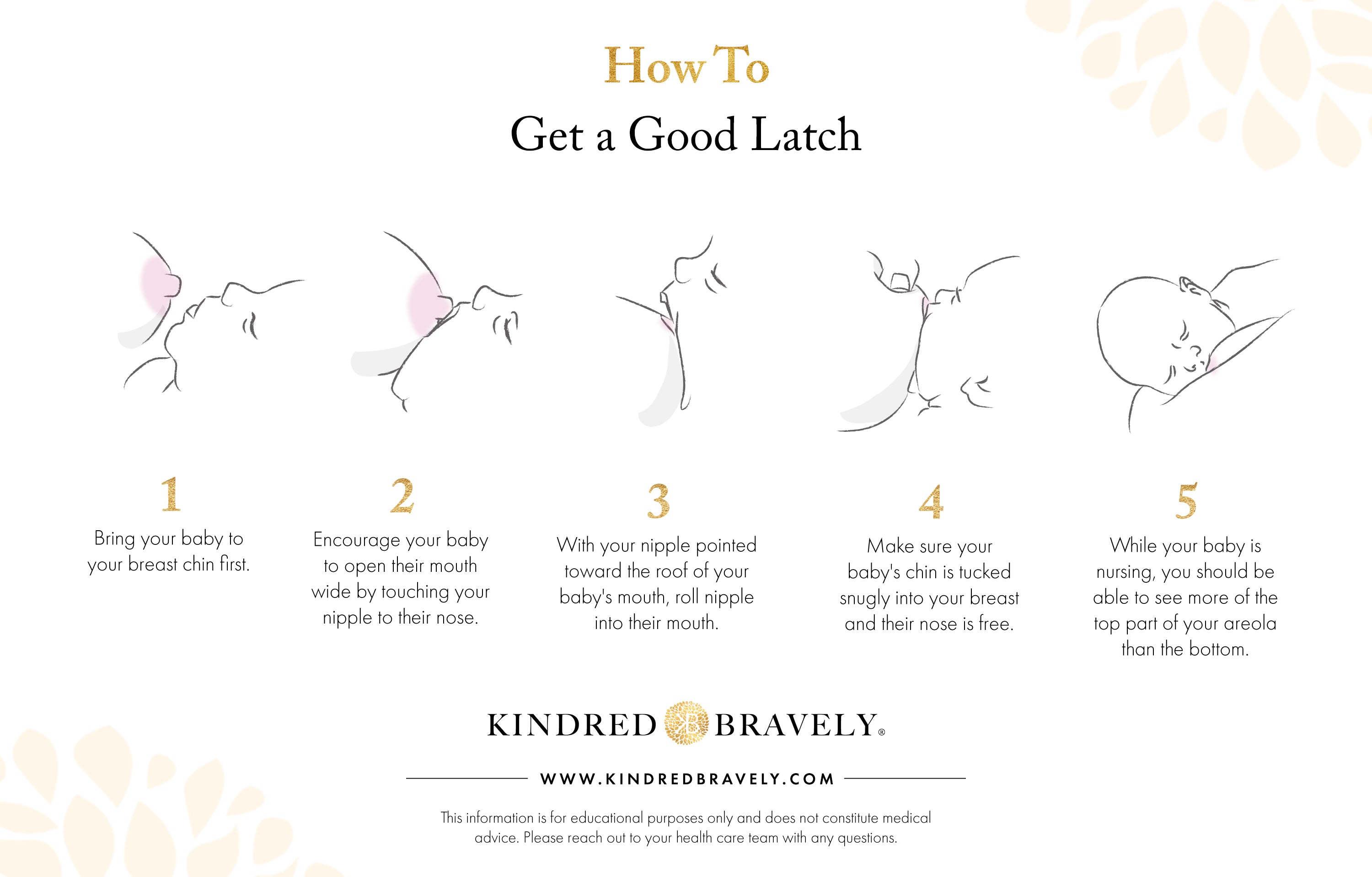You've just finished nursing and put your little one in the baby bouncer so you can eat dinner yourself. As soon as you sit down, however, your baby starts to fuss and turn their head side to side. You check the diaper...dry. Attempt another burp...no luck.
It can't possibly be time to nurse again already, you may think, but in the world of newborns, it probably is!
Your baby may be exhibiting a behavior known as cluster feeding, and although it can be exhausting, it’s completely normal.

What Is Cluster Feeding?
A newborn will typically nurse in a somewhat predictable pattern: every 2-3 hours for roughly 30 minutes, totaling 8-12 times in a 24-hour period. During cluster feeding (sometimes referred to as bunch feeding), a baby will feed several times within that typical window, possibly every hour or even more frequently.
These seemingly continuous cluster feeding sessions, which often occur in the evening and may be accompanied by fussiness, can frustrate and fatigue new parents, who are probably already not getting enough sleep at night.
Despite the difficulties, these frequent feedings help your baby get the nutrients they need. While many nursing moms worry their milk production is slowing and they're not producing enough milk, the frequent nursing during cluster feeding stages signals your body to boost your milk supply to meet the increased demand of your growing baby.
Several factors can lead to cluster feeding, and although it can be difficult to determine the exact cause, the following may play a role:
Milk flow is slower at night.
Because of this, babies need to nurse longer or more often to fill up their tanks. They also tend to drink more to prepare for long stretches of sleeping and growing overnight.
Your baby is experiencing a growth spurt.
Babies grow at an incredibly fast rate during the first few months of life. This rapid infant development means most babies will need to feed more often. Growth spurts generally occur around three, six, and eight weeks after birth.
A developmental leap is in the works.
Just as babies experience physical growth spurts, their nervous systems also undergo mental growth spurts, or “leaps,” during which they acquire new social and emotional skills. Every baby is different, but an app like The Wonder Weeks can help you see if your baby’s cluster feeding syncs up with predictable periods of infant growth and development.
Nursing is soothing for your baby.
Breast milk has hormones that help develop your baby’s circadian rhythm. Many babies cluster feed at night to comfort themselves to sleep. As your baby gets older, you may notice other self-soothing activities such as hair twirling, finger sucking, blanket stroking, or eye rubbing.
Your baby is teething, sick, or thirsty.
As an adult, you can fetch a cold drink or tell a friend you need a hug when you’re feeling stressed. Your fussy baby only has crying, movement, and you for comfort. Breast milk has powerful antibodies that help fight illness, and breastfeeding itself decreases your baby’s pain.
Although cluster feeding can happen at any point, it’s most common during the newborn stage (birth to three months). How long does cluster feeding last? It varies. Many babies stop cluster feeding around three or four months; there is also sometimes a brief cluster feeding stage at six months. These periods can feel like they’ll drag on forever, but in the grand scheme of things, cluster feeding is a phase that will be over before you know it.

Coping with Cluster Feeding and Fussy Evenings
Breastfeeding can be a beautiful bonding experience that lays the foundation for a healthy life ahead, but it’s not always easy, especially when you're getting up for what feels like the hundredth time your baby wants to feed. For an exhausted new parent, cluster feeding can be both physically and emotionally draining. To help you cope when your baby is constantly nursing, we’ve compiled these tips:
1. Acknowledge and accept it.

Know that your baby will be nursing a lot – probably more than you ever thought possible. Some people may even comment on how much your baby nurses.
Reassure them (and yourself!) that your baby is perfectly healthy and just growing. Then, try to accept that once your baby starts cluster feeding, you’ll be spending a lot of time in your favorite nursing spot. Take advantage of it!
Use this time to talk, sing, or read to your baby; make phone calls; read a book or magazine; or binge-watch your favorite TV show. When you anticipate cluster feeding and prepare for it, those hours spent nursing can become a treasured time to relax a bit and enjoy the one-on-one bonding with your baby.
2. Enlist help.

During cluster feeding, it may be difficult for you to accomplish much aside from nursing your baby, so let others help with everything else. From cooking and cleaning to making sure you get to eat during breastfeeding sessions, your support network can make cluster feeding much more bearable.
Don’t hesitate to ask for help. Family and friends often want to lend a hand, but they may not be sure what would help and they worry about intruding on your newborn bonding experience.
3. Get comfortable.

Since you’ll be seated a lot, make sure you have pillows (including a nursing pillow) to support your baby and your back. Keep water and snacks at arm’s reach. Wear soft, practical clothing so you’re more comfortable, like a super-cozy pair of nursing pajamas or an ultra-soft nursing bra that won’t irritate sore nipples. Click here to figure out which nursing bras are right for you.
4. Address breast or nipple pain.
Extra time at the breast means your nipples could become irritated and painful. Thankfully, you don’t have to simply suffer through the pain. Apply breast milk, lanolin, or nipple balm before and after feedings for extra moisture and protection.
If your nipples are sore, cracked, or chafing, use organic bamboo nursing pads to keep your nipples from rubbing against your bra or try hydrogel pads to relieve soreness. If breastfeeding itself is painful, double-check your latch and position and reach out to a lactation counselor or International Board Certified Lactation Consultant (IBCLC).

5. Seek professional support.

Find breastfeeding support early on to answer your questions (Is that rooting? Is this a good latch? Should I supplement with formula? Am I positioning correctly?) at crucial moments in your breastfeeding journey.
Reach out to a board-certified lactation consultant if you’re in pain while nursing or if your baby spends an hour or more at the breast each feeding. Many lactation consultants run wonderful breastfeeding support groups (even virtual ones!), which can be a great way to have your questions answered while interacting with other new moms in the same boat as you. You can also call hotlines for La Leche League at 877-452-5324 and the US Office on Women’s Health at 800-994-9662.
Unless your baby isn’t gaining weight appropriately or producing the expected amount of wet diapers (at least six a day), health care professionals are typically unconcerned when your baby starts to cluster feed. If your baby appears to be in pain or is regularly experiencing forceful spit-up, contact your pediatrician.
6. Remember yourself.

It’s natural to focus on your baby’s needs, but don’t forget about YOU! It’s hard to handle the increased demands on your mind and body when you’re sleep-deprived and your hormones are running wild. Be sure to drink lots of water, eat healthy snacks, and sleep when your baby sleeps (get your own white noise machine if you need it)!
Whenever you have the opportunity to get some time to yourself, whether that means running an errand or taking a walk, take advantage of it. Those little bits of alone time can be just what you need to relax and recharge.
7. Wear your baby.

Snuggling close to mom in a sling or baby carrier is instantly soothing for many cluster feeding babies and may result in a longer stretch of sleep. With practice, you can even nurse on the go to give yourself a change of scenery during long evenings of cluster feeding. Another perk of baby-wearing in a sling or carrier is that when your baby awakens from hunger, you’re right there, ready to offer the next meal.
8. Vary nursing positions.
Click the photo to check out our award-winning Sublime® Nursing Bra.
If sitting on the couch holding your baby for hours at a time is driving you crazy, try nursing in a new position. For some extra rest, you can attempt to nurse in the side-lying or laidback positions. As mentioned above, try nursing while your baby is in a sling; that way, you can move around a bit and use your hands. Using pillows can also allow for some arms-free feeding sessions.
9. Avoid making plans.

Don’t make a lot of plans that fall during your baby’s typical cluster feeding time. Having to continuously break plans will become frustrating -- although virtual hangouts can be a great option for some nursing moms (if your baby doesn’t get too distracted). Plan on being at home or in another setting that is comfortable and safe for both you and your baby.
10. Be patient.

Even the calmest of babies have “witching hours” where it seems nothing, except for perhaps eating yet again, will soothe them -- times when reaching three months of age can feel like it's taking three years.
Although cluster feeding periods can seem endless, the good news is that in just a few months it will be nothing more than an afterthought. For the moment, forgive yourself for letting a few household chores slide. Forget the rest of the world exists, and focus on the simplicity, beauty, and serenity of this time with your precious baby.
While it can be exhausting, cluster feeding is completely normal and temporary. Before you know it, your newborn baby's immature nervous system will move past this stage to a wiggly busybody phase, and you’ll miss the hours the two of you spent snuggled close.
Breastfeeding isn’t always easy, but you’re doing a wonderful thing for your baby. Know any other tips that help with cluster feeding? Please comment below!
Disclaimer: This content is not intended to be a substitute for medical advice, diagnosis, or treatment. Always seek the advice of your health care provider.









